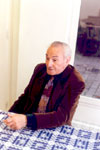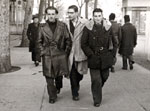Papers of the Spanish anarchist Liberto Sarrau Royes (1920-2001) at the IISH
 Liberto Sarrau Royes died in Paris, October 27, 2001 at the age of 81. In 2002 the IISH received from his widow Joaquina Dorado in Paris Sarrau's personal papers.
Liberto Sarrau Royes died in Paris, October 27, 2001 at the age of 81. In 2002 the IISH received from his widow Joaquina Dorado in Paris Sarrau's personal papers.
Liberto Sarrau was born on 15 June 1920 in Fraga in the province of Huesca. His father, Antonio Sarrau (1893-1939), was a miner but moved with his family to Barcelona following a serious accident at work. There he joined the labour movement as a member of the anarcho-syndicalist CNT. After losing his job as a result of this involvement, his father opened a newspaper stand. So, as a young boy, Liberto learned about the press, and he published his first article in 1932 in the column 'Tribuna Infantil' of the Barcelonese paper
Solidaridad Humana
(vol. 1, nr 2, 15 April). He attended Juan Puig Elias's rationalist Natura school opened by the CNT textile union and wrote two leaflets published in the series
La Novela Ideal
in 1937:
Juanillo el abandonado
(no.545) and
Rebeldia vivida
(no.579). Forty years later the anarchist author Juan Llarch would publish
Los días rojinegros
which dealt with the same subject. Both had been apprentices in the same factory.
In 1936 he became a member of the Juventudes Libertarias (JJLL) and he contributed to its paper
Ruta
. He joined the agricultural collective in Verviá during the early years of the war until he was old enough to join the 26th Division, which was known as the Durruti column. Upon the fall of the Republic, he fled to France where he passed through several camps for Spanish refugees until he managed to flee. His father was executed in Barcelona.
After the Liberation in France, he resumed his involvement in various anarchist publications and the JJLL, holding prominent offices as a member of its French National Committee. In 1946 he returned to Spain with his compañera Joaquina Dorado to organize the resistance movement. In Barcelona they met Raúl Carballeira, the three of them belonging to the group 3 de Mayo .
In Madrid, still in the year 1946, he participated in the establishment of the Comité Peninsular de la Federación Ibérica de Juventudes Libertarias (FIJL). After a brief stay in France he returned to Spain in 1947 to organize the publication of Ruta , and to set up the Movimiento Libertario de Resistencia. The second Congress of the CNT in exile, held in Toulouse in October 1947, removed him as the delegate in Spain of the exile movement, because of differences of opinion on how to organize the clandestine struggle in Spain.
In 1948 he was arrested and tortured. Both Joaquina and he were sentenced to a term of imprisonment. Following their provisional release - Joaquina in 1954 because of poor health and Liberto in 1958 - they fled to France. At this point Liberto helped organize a new resistance movement: the Movimiento Popular de Resistencia.
While working for UNESCO as a translator and corrector, he continued to contribute to several anarchist periodicals, like Ideas-Orto , Solidaridad Obrera and Umbral from Paris, and A Batalha from Lissabon and was involved in the 2e Union régional of the French CNT. In the late 1980s he founded the Asociación Cultural y Ecologista 'Natura' (ACEN), which aimed to run a centre for libertarian education. In vain they tried to purchase the majestic site on which the Natura school's Mon Nou (meaning new world) holiday camp was located.
The archive of Sarrau comprises his correspondence from 1946 until the late 1990s, notes, circulars and pamphlets and other materials concerning the underground movement in Spain and the ACEN. Part of his personal library was also donated to the Institute. In late 2002 Joaquina Dorado entrusted her own file of correspondence to the IISH as well.
Among the books were some camouflaged booklets to deceive the authorities. We reproduce three of them on our photopage as well as one of the booklets that served as a model. Furthermore you will find some of the photos Joaquina entrusted to the Institute, as well as some objects made by Francisco Sabaté during his imprisonment in France in 1958.



